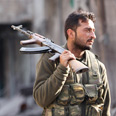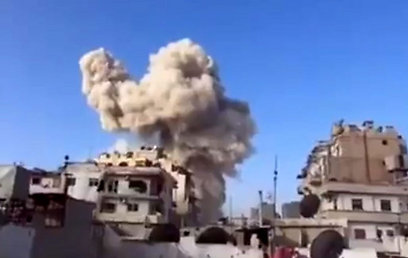
Syrian rebel in Aleppo
צילום: רויטרס
Syrian opposition says may allow peacekeepers if Assad goes
Opposition's umbrella group says will consider international peacekeeping force's presence if president, allies leave war-torn country
Syria's newly-formed opposition coalition said on Saturday it might allow an international peacekeeping force into Syria if President Bashar Assad and his allies leave power.
Coalition spokesman Walid al-Bunni, asked about statements by UN mediator Lakhdar Brahimi that a ceasefire would only hold if overseen by a peacekeeping mission, said the opposition could accept such a deployment if Assad stepped down first.
Related stories:
- Heavy fighting near Syrian capital
- Syrian Internet largely restored after blackout
- Syria: Twin car bombs in Damascus kill 34 people
The issue of peacekeepers is highly sensitive. Many in the opposition fear it could lead to a division of the country along ethnic and religious lines, creating a sanctuary for Assad's loyalists in an area near the Mediterranean where many of his minority Alawite sect live.
Assad, whose family has ruled autocratically for four decades, draws much of his support from the sect, an offshoot of Shiite Islam. Most of the rebels are Sunni Muslims.

Shelling in Homs (Screenshot)
Bunni said the coalition was open to any proposal if Assad and his allies, including top officers in the military and security apparatus, were removed.
"If this is the first condition then we can start discussing everything. There will be no political process until the ruling family and all those who underpin the regime leave," he added.
"Whoever is putting forward a political plan has to know that after 50,000 dead and 200,000 wounded and 5 million displaced, the Syrians will not accept those who repressed them and killed them for the last 50 years staying on."
Bunni, a physician who spent most of the period after Assad inherited power from his father in 2000 in jail as a political prisoner, was speaking at a news conference marking the conclusion of the first full meeting of the 60-member coalition in Cairo.
Syrian jets bombed rebel-held areas of Damascus on Saturday, residents said. Warplanes attacked the Damascus suburbs of Kafar Souseh and Darraya, according to the Syrian Observatory for Human Rights, an opposition-linked group.
The air strikes follow intensified rebel activity in the capital, Assad's seat of power, as well as successful storming of government military bases in recent weeks.
"Syrian regular forces are trying to control the areas surrounding the capital," the Observatory said. Bombings targeted a continuous arc of rebel presence in the capital's outer districts from the northeast to the southwest.
Activists reported clashes and air strikes in the provinces of Homs, Deir al-Zor, Idlib and in Aleppo, where they said 14 rebel fighters were killed during an assault on an army base in the town of Khanasser early on Saturday.
'You can't force democracy'
Britain, France and the Persian Gulf countries have recognized the Syrian National Coalition as the sole representative of the Syrian people.
Most foreign powers have condemned Assad, who has relied on his allies to stay afloat, especially regional powerhouse Iran.
Russia, Syria's main arms supplier, and China have vetoed three UN Security Council resolutions condemning Assad and reject the idea of sanctioning his government.
Russian Foreign Minister Sergei Lavrov accused Western states on Saturday of trying to advance democracy abroad through "iron and blood."
"Advancing democracy through iron and blood just does not work, and this has been made clear in recent months – the past year-and-a-half," Lavrov said, according to Russia's state-run news agency Itar-Tass.
Russia repeated its opposition on Friday to NATO's potential deployment of Patriot missiles in Turkey, which wants them because of fears of a spillover from the war in Syria.
- Receive Ynetnews updates directly to your desktop










